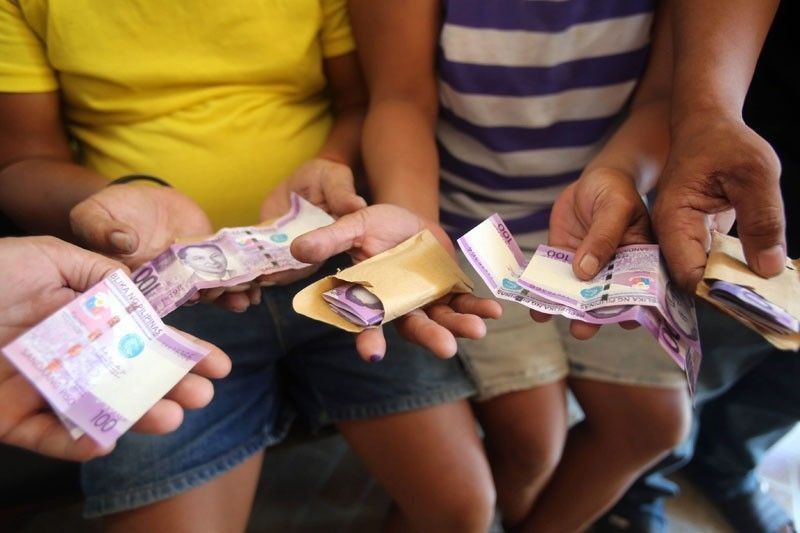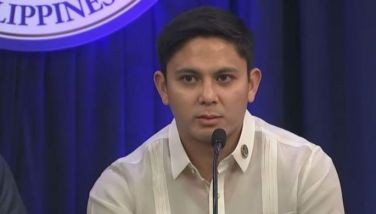Poll watchdog: Vote buying worsened this year

MANILA, Philippines — Parish Pastoral Council for Responsible Voting (PPCRV) board member Arwin Serrano yesterday claimed that incidents of vote buying have worsened this election year compared to the 2016 polls.
Although he did not cite figures on the number of reported vote-buying incidents, he said in an interview that the claim is based on the information they have been receiving.
Most of the incidents, he added, are happening in “hotly contested locations” and in the provinces as candidates look for ways to beat opponents in the upcoming May 13 polls.
Serrano said the vote-buying rate of some candidates is at P500 per voter or at P5,000 for a family with 10 voters.
Vote buying, he added, is done even by those running for lower positions, such as that of councilor in the local level.
“There are many reports of vote buying in the provinces, although we have been receiving information that it is also happening in the National Capital Region (NCR), especially in the poor communities,” Serrano revealed.
He warned that a more aggressive effort of vote buying and vote selling is expected as election day draws near, even as he appealed to voters not to give in to these temptations or accept money or tokens in exchange for votes.
Serrano agreed with the earlier warning of Commission on Elections (Comelec) spokesman James Jimenez for voters to refrain from selling their votes. Should the buyers win, the electorate does not have the power to demand an improvement of basic services as their votes were paid for.
“I hope that we would vote wisely. Pray for those who we would vote for, and pray for a peaceful and credible elections,” Serrano added.
With only 10 days left before the polls, the Comelec said it is 95 percent ready for May 13.
This would have already been 100 percent at this point, Jimenez said during yesterday’s news briefing in Quezon City, but the efforts were hampered by the damage to schools during the recent earthquakes in Luzon, the Visayas and Mindanao.
“The reason there is some sort of hesitation to say 100 percent is because we are still, at this point, trying to find out if you are going to move certain polling places. If we get reports of structurally unsound polling place then we are going to have to initiate moves to transfer it somewhere else,” Jimenez explained.
He added that they have yet to receive an update on school buildings in quake-affected areas that sustained significant damage.
Apart from this problem, Jimenez said all vote-counting machines (VCMs) have been delivered to regional hubs and far-flung areas and that the ballots as well as teachers who will serve as electoral boards are ready.
“In general, we are just really waiting for the day itself,” he added.
Comelec executive director Jose Tolentino Jr. said the source codes of the remaining components of the automated election system (AES) were already deposited to the Bangko Sentral ng Pilipinas (BSP).
The codes include that of the Operating System (OS) image rebuild for the Consolidation and Canvassing System (CCS), Transmission Router and the Domain Name Server (DNS) Janitor.
“To be escrowed are the remaining source codes that were reviewed and certified by our international certification entity and were also reviewed by our local source code reviewers. No one has found or said that they found that there is any malicious code embedded in the source codes,” Tolentino said.
Last February, the Comelec deposited with the BSP the source codes for the Election Management System (EMS), CCS and the VCMs.
The Poll Automation Law mandates that the source code of the AES must be kept in escrow with the BSP.
As this developed, Tolentino debunked reports that the official ballots to be used in the coming polls have been pre-shaded.
“We tested. The marks using UV inks weren’t read by the VCM, which looks for black ink or those that are always visible so to speak,” Tolentino pointed out.
Allegations of ballots being marked by UV inks making it invisible to the naked eye have been circulating online. It was alleged that the hidden marks can only be seen using ultraviolet (UV) lamps.
But Tolentino said the ballots have QR codes, a serial number and a precinct assignment.
“It was obviously a staged video because it doesn’t have those features. It was a waste because they already staged a video yet they used the wrong ballot as prop,” he said.
Tolentino said the Comelec will pursue a case and hold the people behind the video and other such activities liable. Undermining public confidence in the elections, he added, is considered an election offense.
Meanwhile, Vice President Leni Robredo reiterated yesterday the need for a Senate that would closely study policies of the present administration.
“This election is very important because this administration still has three years. We see that they are pushing for some advocacies,” she said in Filipino, citing federalism, Charter change, reimposition of death penalty, lowering of the age of criminal liability and the country’s relationship with China. “All of these are important for the future of our country and these will pass through the Senate.”
Robredo said the upcoming election is an opportunity to vote for candidates who would represent the people well.
“It is a frightening scenario if we put in the Senate those who would just say ‘Yes, Sir’ to whatever the President wants even without studying and debating it... We don’t want that. What (the senators) represent are not the President but the people. At the same time, we also don’t want those who would just say no to everything. What we want is if it is good, they agree; but if not, they disagree,” she pointed out.
Less than two weeks before the elections, the Vice President said she remains hopeful that the opposition candidates would enter the so-called “Magic 12” despite lagging in surveys.
The Philippine National Police has deployed at least 160,000 police officers to secure the elections, a figure which PNP spokesman Col. Bernard Banac said is higher than the previously announced 143,000 policemen.
Banac explained that the increase does not mean that an imminent threat has been monitored as this is simply to “ensure that no untoward incident or violence would take place.”
Aside from securing the polling and canvassing centers, the PNP is also expected to secure the transport of Comelec equipment and to conduct more security checkpoints and law enforcement operations against armed groups who could pose threats. – With Emmanuel Tupas, Mayen Jaymalin, Janvic Mateo
- Latest
- Trending





























